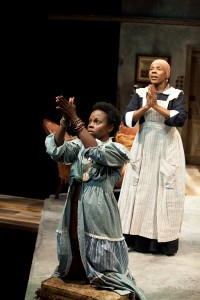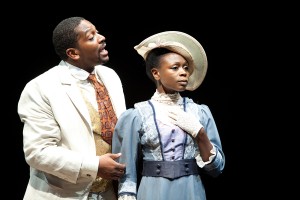
Colonialism is Pygmalian writ large: one culture trying to civilize another. In Danai Gurira’s melodramatic THE CONVERT, a priggish preacher (Irungu Mutu) in 1895 Rhodesia (present-day Zimbabwe) seeks to educate and convert a young woman (Nancy Morisette) who enters his home with her chest covered only by a tribal necklace. But this Henry Higgins is himself an Eliza Doolittle: his education, Catholic religion, and mannerisms have been instilled by “condescendingly well-meaning” Europeans.
Southern Africa before Cecil Rhodes was no idyll: Forced marriage and the murder of twin babies were facts of life. Houses had cow dung floors. But what good are concrete floors? Replacing ancestor worship with Christian superstitions, British rule comes with its own savagery: rough justice, forced labor, a culture destroyed. Though no white characters cross the stage of THE CONVERT, they loom over the action.
But in creating this nuanced look at colonialism. Gurira neglects nuances of character and plot. The costumes (Helen Huang) are convincingly Victorian and African (if not Victorian-African and African-Victorian), but the dialog is anachronistically modern, if laced with Zimbabwean cadence (church attendance is “dwindling to say the most least”). The moral values are solidly twenty-first century. The action is over-plotted and histrionic: a dead man’s lover is left pregnant! the murdered man was just about to commit his own heinous crime! a stolen watch incriminates the murderer! The characters are archetypes—a maid (Starla Benford) in the age-worn mold of Harriet Beecher Stowe’s Aunt Chloe, a womanizing elite (Lance Coadie Williams) and his long-suffering but much-knowing fiancee (Zainab Jah)—or plot points—the avaricious uncle (Steven Wright), the accidental killer (Joshua E. Nelson).

The cast excels within these confines. Jah gives an especially engaging performance as a woman too educated for her place and time and not quite willing to accept these realities. But over the course of three acts it’s difficult to sustain much concern for characters whose interactions are beholden to the theatrical rather than the subtly human. A brutal off-stage murder which fits the the play’s statement on colonialism, but not the previously established characters, is especially grating.
There are moments of beauty, not least the touching (and well-constructed!) ending. And if the interpersonal relationships fail to engage, other aspects of the production do It might be noticeable in part because focus drifts from the melodramatic action, but Colin K. Bills’s lighting design is of a remarkably high standard. Delicate stone-colored light flatters the action, a colored backdrop shifts from murderous blood-red to the day-break orange of new beginnings. Beautiful. October 9-November 10, 2013, wilmatheater.org.
